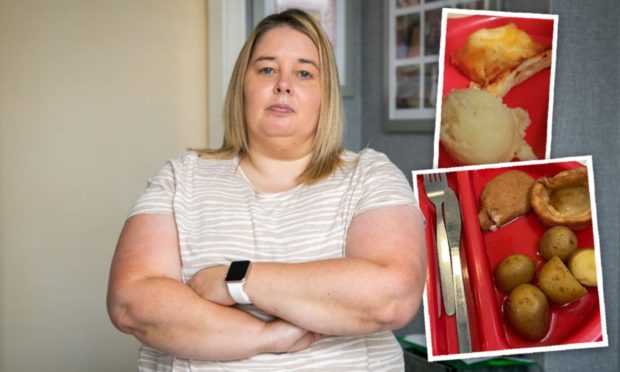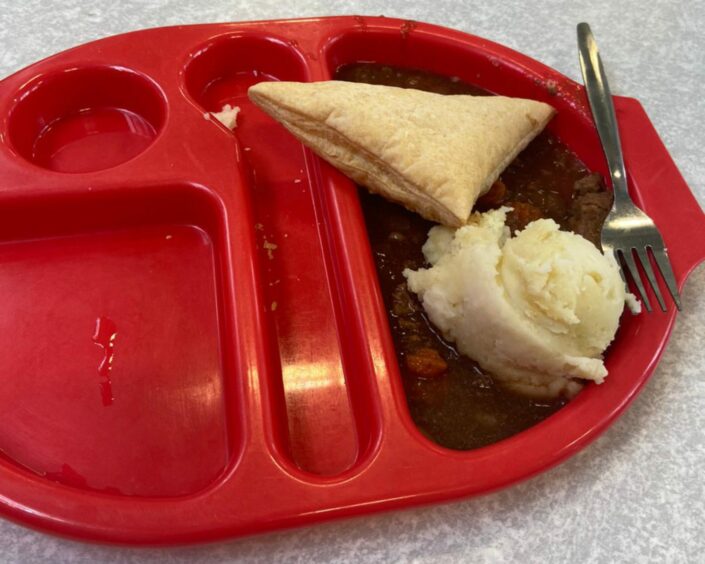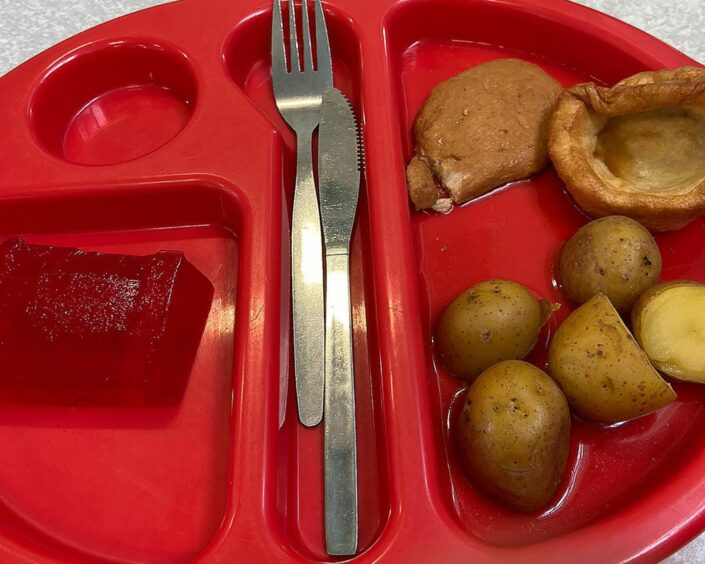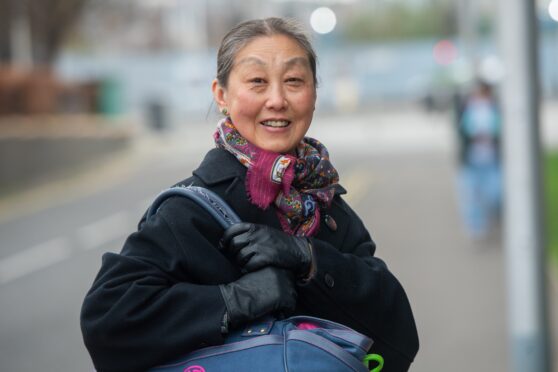Catering staff have ‘no option’ but to serve food in some primary schools even if they know there is a problem with it, says a union rep.
Stephanie Smith, Dundee rep of the GMB union for school catering staff, says staff at some schools feel they have to serve problem batches of dinners because they have no other stock immediately available.
And, she says, staff do not feel they have enough time before service to chase up alternative food sources, due to either workload or the distance food would have to travel.
Stephanie says the issue has arisen since supplier Tayside Contracts moved to mass produced food in April, leaving some schools without cooking facilities or food stock.
These ‘dining centre’ schools simply receive deliveries of hot meals shortly before service, then dish them out to pupils.
Stephanie, who works in catering in a Dundee high school, says the quality of food currently offered in primary schools is ‘poor’ compared to when food was cooked on site.
Supplier Tayside Contracts has denied any drop in quality and says dining centres have always existed, there are now ‘just a few more’ of them.
In Dundee the number of dining centres increased from five to 18 when Tay Cuisine industrial kitchen was introduced – meaning 43% of schools in the city are now dining centres.
And in Angus 57% of schools now fall into that category, after the number of dining centres increased from 29 to 33.
All dining centres rely on hub kitchens based in other schools, some of which are cooking meals to feed up to four schools.
Stephanie said: “Some of these (hub) kitchens are putting out around 800 meals, it’s a lot to be putting out. Then they’re sent hot to dining centres who’ve got two or three staff.
“By the time they see there is a problem with the potatoes, for example, and make a phone call to the hub to say the potatoes aren’t right, it’s just before service.”
‘What can they do?’
Schools in Dundee and Angus have served mass produced, reheated frozen meals since April, when Tayside Contract’s Tay Cuisine took over production of main meals.
Meals are cooked at Tay Cuisine in large batches, frozen, then sent to schools with ‘hub’ kitchens for reheating.
Stephanie said: “When the food comes to school – if it isn’t good quality, what can you do? How can you subsidise that?
“There’s no stock in these kitchens to make anything else, so even if something has happened to the food when it’s been regened [reheated], the staff still need to serve it.
“One head teacher said to me they got what they thought was scrambled eggs but it was custard. It hadn’t regened properly but what could they do?”
A spokeswoman for Tayside Contracts said: “(Hub) kitchens receive deliveries for multiple days, there would always be an alternative to serve in the event of an emergency.”
But hub kitchens also have to cook accompaniments for their own schools and to send to dining centre schools without cooking facilities, along with the reheated main meals.
Stephanie added that accompaniments are cooked “really close to serving time” so if there is an issue with those staff feel there is no time to cook something else, even at hub kitchen level.
The supplier’s spokeswoman commented: “There has been no change to the arrangements for the cooking of accompaniments.
“These are not part of the cook-freeze process and would always have been cooked fresh close to service time to maintain quality.”
‘Suppliers were pre-warned of issues’
Stephanie was not shocked to see 5 photos that convinced Dundee mum on benefits to refuse free meals which showed photographs of actual meals served to children at Tayside primary schools.
The photo revelation left many parents across the region reeling, with some commenting that the meals looked ‘disgusting’.
But Stephanie, herself a mum and grandmother, from Fintry, says it’s exactly the ‘poor quality’ of food she and hundreds of others of school catering staff tried to fight, two years ago.
In May 2019 she launched a petition against the introduction of frozen meals in Tayside, which went on to gain hundreds of signatures.
She said: “Everything we said would happen, has happened.
“Because it’s happening in primary schools it’s hard to get it out there because most children can’t take photos.”
Stephanie, who has worked in school catering for 16 years, says it ‘used’ to be a job which catering staff took pride in.
She added: “A lot of the staff left because of it.
“I can’t speak for everyone but a lot of people take pride in what they put out and I know I wouldn’t be happy with putting that out.
“But what choice do they have because they’ve got no other food to put out.”
The firm’s spokeswoman said: “Since the implementation of the cook-freeze school service delivery model, catering teams have been encouraged to feed back on the meals and to highlight any issues to their supervisor immediately so they can be rectified as quickly as possible.
“There were a few teething issues raised in the early stages which were quickly rectified.”
She also pointed out that not all of the main meals are cook-freeze and a proportion of meals and starters are made at hub kitchen level.
The spokeswoman continued: “School meals are prepared using the same recipes and high-quality ingredients that they were prior to the implementation of the cook-freeze system.
“The meals are quality checked and the cook-freeze process is of no detriment to the standard of meals served.
“In the event of any quality issues raised, tweaks have been made to recipes and cooking time and temperature combinations to ensure the desired quality is achieved.”














